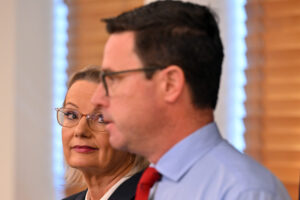Another Democracy Agenda reform ticked off

Last week, Education Minister Jason Clare announced that he was going to remove political interference from the Australian Research Council grants process (except for national security concerns). It is a victory for academic freedom, and a testament to the work of Senator Mehreen Faruqi – who proposed the Ensuring Research Independence Bill back in 2018.
Ahead of the 2022 election, the Australia Institute identified over 40 reforms for the incoming 47th Parliament to consider – including removing the ministerial veto over Australian Research Council grants.
This marks the fifteenth reform proposed in the Democracy Agenda that has been implemented or progressed since the 2022 election. Some of the reforms have received widespread attention and have been widely celebrated:
- Australia now has a National Anti-Corruption Commission to investigate allegations of corruption at the federal level. In its less than two months of operation it has received over 400 referrals, of which only about 12 per cent relate to matters well publicized in the media.
- The Albanese Government has committed to implement truth in political advertising laws, after the Parliament’s electoral matters review has concluded. Australia Institute research into South Australia’s truth in political advertising laws shows that such regulations can be effective in limiting misleading advertising and changing political culture.
- The referendum on whether to enshrine an Aboriginal and Torres Strait Islander Voice to Parliament will be held later this year.
Progress on other reforms has attracted less attention, despite their importance:
- The Labor majority on the Parliamentary Joint Committee on Intelligence and Security (PJCIS) has recommended allowing crossbench MPs and senators to join the committee. In 2020, Australia Institute research found that Australia was unusual among its Five Eyes partner countries in not allowing minor party or independent members on its intelligence oversight committee.
- The Albanese Government is developing a model for an Evaluator-General, based in Treasury. As originally proposed by economist Nicholas Gruen, an Evaluator-General would have similar powers to the Auditor-General, but where the Auditor-General assesses whether processes have been followed correctly the Evaluator-General would assess whether outcomes have been achieved. So far, Labor’s model seems more limited than that originally envisaged by Gruen.
- There is a real chance that the Australian Capital Territory and the Northern Territory will receive more senators, with the policy adopted at Labor national conference. The territories have historically missed out on Senate representation relative to the states: even Tasmania receives 12 senators to the ACT and NT’s two each.
- The Albanese Government is part way through its election commitment to cut spending on consultants and labour hire, a commitment only made more urgent by rolling scandals involving governments’ relationships with expensive, conflicted consulting firms.
That’s not to mention important parliamentary reforms, like the ongoing implementation of the Kate Jenkins Setting the Standard report on parliamentary workplaces, a code of conduct for parliamentarians and their staff and including blind trusts in the register of ministers’ interests.
Read all 40+ reform ideas in the Democracy Agenda for the 47th Parliament and join 2,600 fellow Australians in signing our letter to Parliament calling for the reforms to be implemented.
Between the Lines Newsletter
The biggest stories and the best analysis from the team at the Australia Institute, delivered to your inbox every fortnight.
You might also like
The election exposed weaknesses in Australian democracy – but the next parliament can fix them
Australia has some very strong democratic institutions – like an independent electoral commission, Saturday voting, full preferential voting and compulsory voting. These ensure that elections are free from corruption; that electorate boundaries are not based on partisan bias; and that most Australians turn out to vote. They are evidence of Australia’s proud history as an
Gender parity closer after federal election but “sufficiently assertive” Liberal women are still outnumbered two to one
Now that the dust has settled on the 2025 federal election, what does it mean for the representation of women in Australian parliaments? In short, there has been a significant improvement at the national level. When we last wrote on this topic, the Australian Senate was majority female but only 40% of House of Representatives
The 2025 federal election is the first where a major party received fewer votes than independents and minor parties.
While the May election result was remarkable for the low vote share going to the major parties, it was just the most recent of a very long trend.
